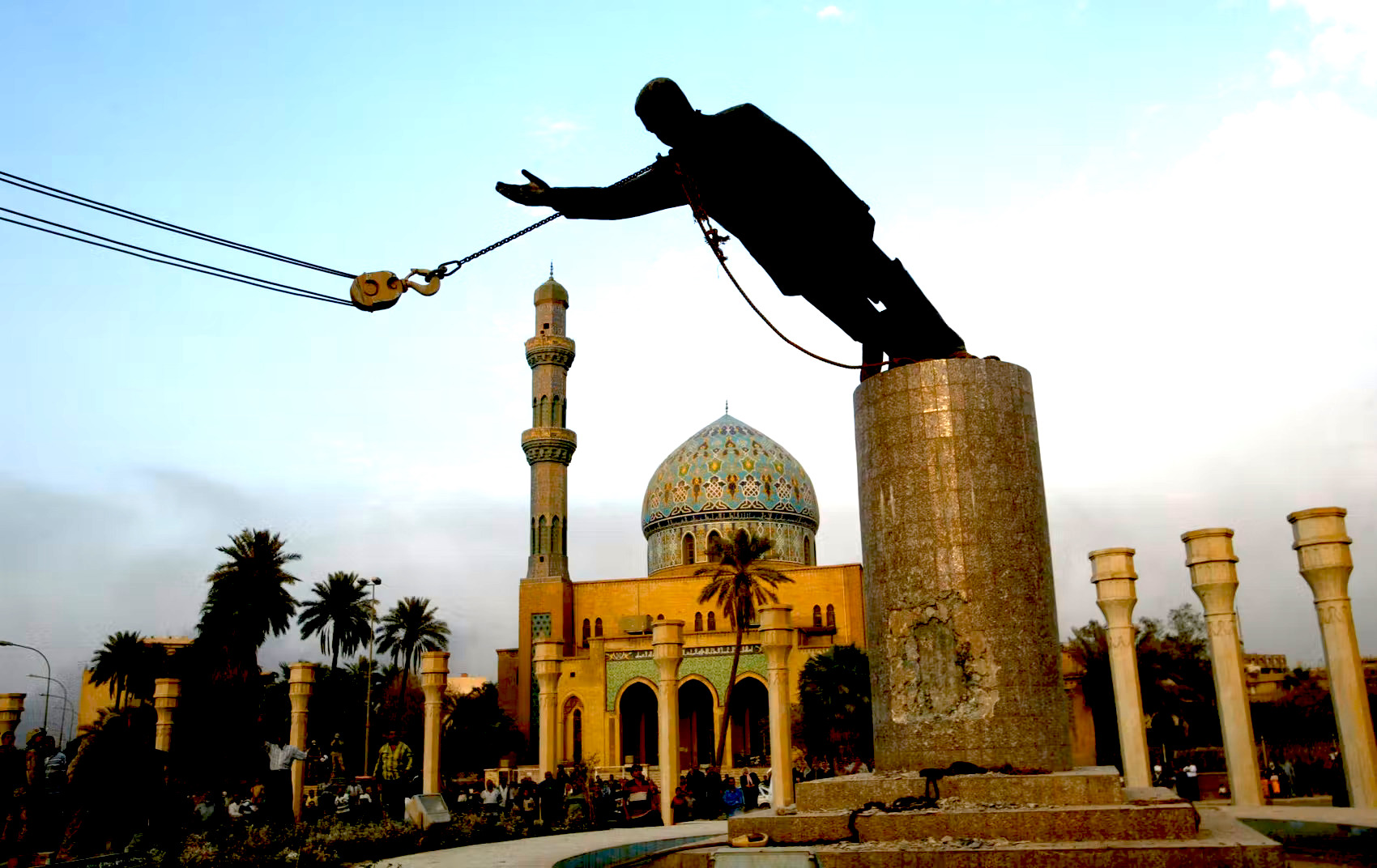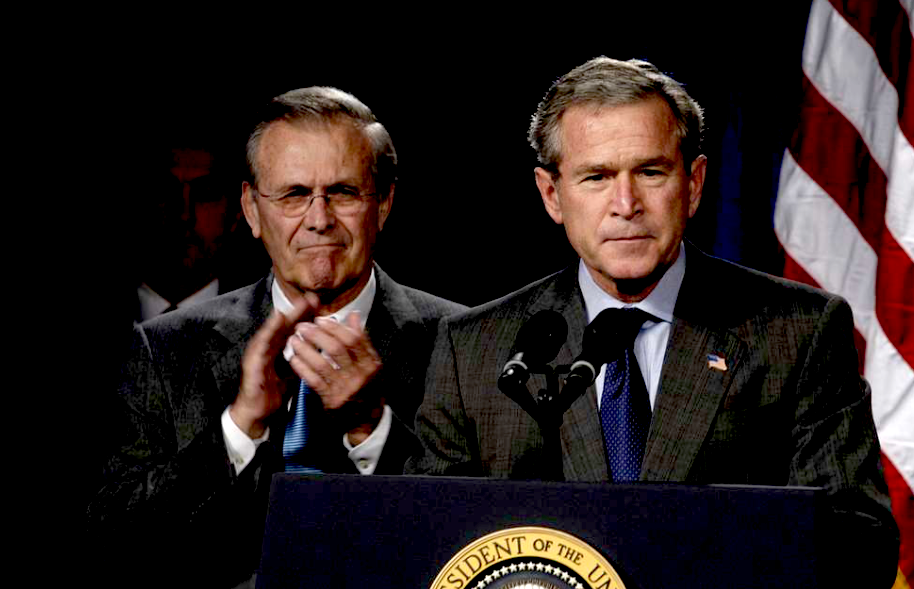The military machine commits fiascos abroad. At home, by diverting funds and resources to endless war, it disembowels and impoverishes the nation.

Saddam Hussein’s statue toppled in Baghdad shortly after the invasion of Iraq in 2003. (DoD, Public domain, Wikimedia Commons)
By Chris Hedges
Declassified UK
 The public perception of the American empire, at least to those within the United States who have never seen the empire dominate and exploit the “wretched of the earth,” is radically different from reality.
The public perception of the American empire, at least to those within the United States who have never seen the empire dominate and exploit the “wretched of the earth,” is radically different from reality.
These manufactured illusions, ones Joseph Conrad wrote so presciently about, posit that the empire is a force for good. The empire, we are told, fosters democracy and liberty. It spreads the benefits of “Western civilization.”
These are deceptions repeated ad nauseam by a compliant media and mouthed by politicians, academics and the powerful. But they are lies, as all of us who have spent years reporting overseas understand.
Matt Kennard in his book The Racket — where he reports from Haiti, Bolivia, Turkey, Palestine, Egypt, Tunisia, Mexico, Colombia and many other countries — rips back the veil. He exposes the hidden machinery of empire. He details its brutality, mendacity, cruelty and its dangerous self-delusions.
In the late stage of empire, the image sold to a gullible public begins to entrance the mandarins of empire. They make decisions based not on reality, but on their distorted visions of reality, one coloured by their own propaganda.
Matt refers to this as “the racket.” Blinded by hubris and power they come to believe their deceptions, propelling the empire towards collective suicide. They retreat into a fantasy where hard and unpleasant facts no longer intrude.
They replace diplomacy, multilateralism and politics with unilateral threats and the blunt instrument of war. They become the purblind architects of their own destruction.
Matt writes:
“A couple of years after my initiation at The Financial Times a few things started to become clearer. I came to realise a difference between myself and the rest of the people staffing the racket — the United States Agency for International Development (USAID) workers, the economists in the International Monetary Fund (IMF), and so on.”
He continues,
“While I was coming to understand how the racket really worked, I started to see them as willing dupes. There was no doubt they seemed to believe in the virtue of the mission; they imbibed all the theories that were meant to dress up global exploitation in the language of ‘development’ and ‘progress’. I saw this with American ambassadors in Bolivia and Haiti, and with countless other functionaries I interviewed.”
“They genuinely believe the myths,” he concludes,
“and of course are paid handsomely to do so. To help these agents of the racket get up in the morning there also exists, throughout the West, a well-stocked army of intellectuals whose sole purpose is to make theft and brutality acceptable to the general population of the U.S. and its racketeering allies.”
The United States carried out one of the greatest strategic blunders in its history, one that sounded the death knell of the empire, when it invaded and occupied for two decades Afghanistan and Iraq.
The architects of the war in the George W. Bush White House, and the array of useful idiots in the press and academia who were cheerleaders for it, knew very little about the countries being invaded. They believed their technological superiority made them invincible.

Matt Kennard. (Twitter/X)
They were blindsided by the ferocious blowback and armed resistance that led to their defeat. This was something those of us who knew the Middle East — I was the Middle East bureau chief for The New York Times, speak Arabic and reported from the region for seven years — predicted.
But those intent on war preferred a comforting fantasy. They stated, and probably believed, that Saddam Hussein had weapons of mass destruction, although they had no valid evidence to support this claim.
They insisted that democracy would be implanted in Baghdad and spread across the Middle East. They assured the public that U.S. troops would be greeted by grateful Iraqis and Afghans as liberators. They promised that oil revenues would cover the cost of reconstruction.
They insisted that the bold and quick military strike — “shock and awe” — would restore American hegemony in the region and dominance in the world. It did the opposite. As Zbigniew Brzezi?ski noted, this “unilateral war of choice against Iraq precipitated a widespread delegitimation of U.S. foreign policy.”
The War State
America since the end of World War II has become a stratocracy — government dominated by the military. There is a constant preparation for war. The war machine’s massive budgets are sacrosanct. Its billions of dollars in waste and fraud are ignored.
Its military fiascos in Southeast Asia, Central Asia and the Middle East disappear into the vast black hole of historical amnesia. This amnesia, which means there is never accountability, licences the war machine to leap from military debacle to debacle while it economically disembowels the country.
The militarists win every election. They cannot lose. It is impossible to vote against them. The war state is a Götterdämmerung, as Dwight Macdonald writes, “without the gods.”

Nov. 24, 2004: U.S. Secretary of Defense Donald Rumsfeld applauding President George W. Bush during his remarks at the Pentagon on a military spending bill. (DoD)
Since the end of the Second World War, the federal government has spent more than half its tax dollars on past, current and future military operations. It is the largest single sustaining activity of the government.
Military systems are sold before they are produced with guarantees that huge cost overruns will be covered.
Foreign aid is contingent on buying U.S. weapons. Egypt, which receives some $1.3 billion in foreign military financing, is required to devote it to buying and maintaining U.S. weapons systems.
Israel, meanwhile, has received $158 billion in bilateral assistance from the U.S. since 1949, almost all of it since 1971 in the form of military aid, with most of it going towards arms purchases from American weapons manufacturers.
The U.S. public funds the research, development and building of weapons systems and then buys these same weapons systems on behalf of foreign governments. It is a circular system of corporate welfare.
In the year to September 2022, the U.S. spent $877 billion on the military. This was more than the next 10 countries — including China, Russia, Germany, France, and the United Kingdom — combined.
These huge military expenditures, along with the rising costs of a for-profit healthcare system, have driven the U.S. national debt to over $31 trillion, nearly $5 trillion more than the U.S.’ entire Gross Domestic Product (GDP).
This imbalance is not sustainable, especially once the dollar is no longer the world’s reserve currency. As of January 2023, the U.S. spent a record $213 billion servicing the interest on its national debt.
The Empire at Home
The military machine, by diverting funds and resources to endless war, disembowels and impoverishes the nation at home, as Matt’s reporting from Washington, Baltimore and New York illustrates.
The cost to the public — socially, economically, politically and culturally — is catastrophic. Workers are reduced to subsistence level and preyed upon by corporations that have privatised every facet of society from health care and education to the prison-industrial complex.
Militarists divert funds from social and infrastructure programs. They pour money into research and development of weapons systems and neglect renewable energy technologies. Bridges, roads, electrical grids and levees collapse. Schools decay. Domestic manufacturing declines. Our public transportation system is a shambles.
Militarised police gun down mostly unarmed, poor people of colour and fill a system of penitentiaries and jails that hold a staggering 25 percent of the world’s prisoners although Americans represent only 5 percent of the global population.
Cities, deindustrialized, are in ruins. Opioid addiction, suicide, mass shootings, depression and morbid obesity plague a population that has fallen into profound despair.
Militarised societies are fertile ground for demagogues. Militarists, like demagogues, see other nations and cultures in their own image — threatening and aggressive. They seek only domination. They peddle illusions of a return to a mythical golden age of total power and unlimited prosperity.
The deep disillusionment and anger that led to Donald Trump’s election — a reaction to the corporate coup d’état and the poverty afflicting at least half of the country — have destroyed the myth of a functioning democracy.
As Matt notes:
“The American elite that has grown fat from looting abroad is also fighting a war at home. From the 1970s onwards, the same white-collar mobsters have been winning a war against the people of the US, in the form of a massive, underhand con. They have slowly but surely managed to sell off much of what the American people used to own under the guise of various fraudulent ideologies such as the ‘free market’. This is the ‘American way’, a giant swindle, a grand hustle.”
He continues,
“In this sense, the victims of the racket are not just in Port-au-Prince and Baghdad; they are also in Chicago and New York City. The same people that devise the myths about what we do abroad have also built up a similar ideological system that legitimises theft at home; theft from the poorest, by the richest. The poor and working people of Harlem have more in common with the poor and working people of Haiti than they do with their elites, but this has to be obscured for the racket to work.”
“Many actions taken by the US government, in fact, habitually harm the poorest and most destitute of its citizens,” he concludes. “The North American Free Trade Agreement (NAFTA) is a good example. It came into force in January 1994 and was a fantastic opportunity for US business interests, because markets were opened up for an investment and export bonanza. Simultaneously, thousands of US workers lost their jobs to workers in Mexico where their wages could be beaten down by even poorer people.”
Self-Immolation

“Collateral Crucifixion” mural created by the artist duo Captain Borderline on the side of a house in Berlin, April 2021. (Singlespeedfahrer, Wikimedia Commons, CC0)
The public, bombarded with war propaganda, cheers on their self-immolation. It revels in the despicable beauty of U.S. military prowess. It speaks in the thought-terminating clichés spewed out by mass culture and mass media. It imbibes the illusion of omnipotence and wallows in self-adulation.
The mantra of the militarised state is national security. If every discussion begins with a question of national security, every answer includes force or the threat of force. The preoccupation with internal and external threats divides the world into friend and foe, good and evil.
Those such as Julian Assange who expose the crimes and suicidal folly of empire are ruthlessly persecuted. The truth, a truth Matt uncovers, is bitter and hard.
“While rising empires are often judicious, even rational in their application of armed force for conquest and control of overseas dominions, fading empires are inclined to ill-considered displays of power, dreaming of bold military masterstrokes that would somehow recoup lost prestige and power,” the historian Alfred McCoy writes.
“Often irrational even from an imperial point of view, these micro military operations can yield haemorrhaging expenditures or humiliating defeats that only accelerate the process already under way.”
It is vital we see what lies before us. If we continue to be entranced by the images on the walls of Plato’s cave, images that bombard us on screens day and night, if we fail to understand how empire works and its self-destructiveness we will all, especially with the looming climate crisis, descend into a Hobbesian nightmare where the tools of repression, so familiar on the outer reaches of empire, cement into place terrifying corporate totalitarian states.
Chris Hedges worked for nearly two decades as a foreign correspondent in Latin America, the Middle East and the Balkans for The New York Times, National Public Radio and other news organisations.

No comments:
Post a Comment